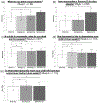Is obesity in the brain? Parent perceptions of brain influences on obesity
- PMID: 34939352
- PMCID: PMC9373357
- DOI: 10.1111/ijpo.12881
Is obesity in the brain? Parent perceptions of brain influences on obesity
Abstract
Neuroimaging studies demonstrate associations of brain structure and function with children's eating behaviour and body weight, and the feasibility of integrating brain measures into obesity risk assessment and intervention is growing. However, little is known about lay perceptions of how the brain influences obesity. We investigated parent perceptions of brain contributions to obesity in three separate studies: 1) a study of mothers of adolescents recruited for neuroimaging research (n = 88), 2) a study of ethnically Chinese parents of 5-13 year olds participating in a parent feeding survey (n = 277), and 3) a study of parents of 3-15 year olds completing an online survey (n = 113). In general, parents believed that brain factors influence obesity, but considered them less influential than behaviours such as diet and exercise. Causal attributions for brain factors were correlated with attributions for genetic factors and biological factors (e.g., metabolism). Parents who perceived their child to be overweight or had a high concern about their child becoming overweight in the future rated brain factors as more important in determining their child's weight and more likely to lessen their child's ability to control their weight. Our results suggest that parents attribute obesity to the brain to a moderate degree, and that education or feedback regarding brain influences on obesity could be a promising obesity intervention component.
Keywords: brain; causal perceptions; childhood obesity; genetics; parents.
© 2021 World Obesity Federation.
Conflict of interest statement
CONFLICT OF INTEREST
The authors have no conflicts of interest.
Figures


References
Publication types
MeSH terms
Grants and funding
LinkOut - more resources
Full Text Sources
Medical

